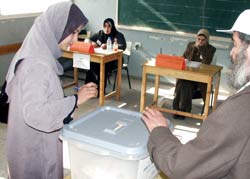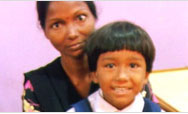You are here » Home » Telling Our Story
Case Study
Grassroots effort mobilizes Palestinians to take ownership of election
Observers Oversee Historic Vote

| |
Photo: USAID/Yusef Abu-Eljedian, Tamkeen
|
|
A Palestinian woman cast her vote at a Gaza polling station on January 9, 2005.
On election day, civil society organizations were present at 80 percent of the 1,000-plus polling centers set up in Palestinian cities, towns, villages and refugee camps.
|
Challenge
Dire economic conditions, lack of security and a history of government corruption are realities
of life in the West Bank and Gaza, making the practice of democracy particularly challenging.
Most Palestinians are preoccupied with making ends meet and navigating the complexities of an
environment fraught with political instability, restrictions on movement and sporadic violence.
In such a context, setting the stage for a free and fair electoral process is daunting at best —
even more so given that presidential elections are new to the Palestinian people.
Initiative
In the lead-up to the presidential elections of January 9 — the first since Yasser Arafat's
death and the second ever — USAID provided $16 million in grants to almost 100 Palestinian
organizations to strengthen civil society and promote democracy. The project trained 118
community leaders from 60 organizations, who then organized and fielded hundreds of domestic
election observers, including prominent numbers of youths and women. USAID also funded
awareness-building campaigns to educate voters on their rights and responsibilities,
the basics of the election process, and the candidates' platforms — all in a non-partisan way.
Results
On election day, civil society organizations were present at 80 percent of the 1,000-plus
polling centers set up in Palestinian cities, towns, villages and refugee camps. Three thousand
observers were fielded in the West Bank, 2,000 in Gaza. Observers who received adequate training
were more engaged and active than those who did not, asking questions, taking notes, completing
questionnaires and, in some cases, helping to resolve issues between voters and election officials.
The grassroots participation in the election observation effort demonstrated democracy in action,
giving Palestinians a sense of ownership over the conduct and outcome of the vote. With USAID
support, the organizations involved in the election observation are drawing on what they
learned to become neutral watchdogs over the emerging democratic process.
Print-friendly version of this page (244kb - PDF)
Click here for high-res photo
Back to Top ^ | 

